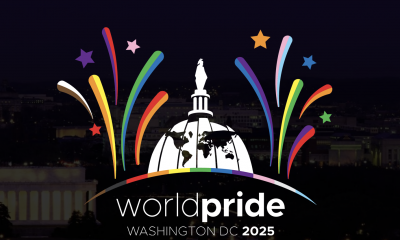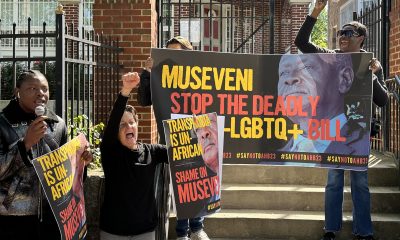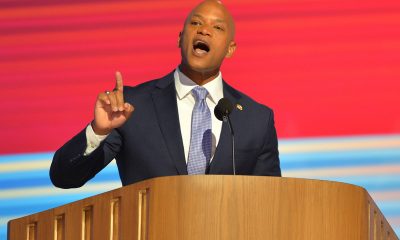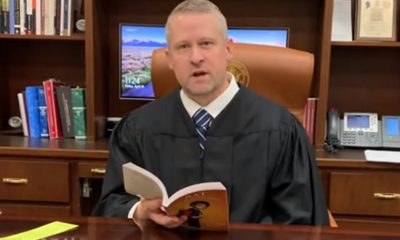National
U.S. Congress moves against anti-gay Uganda bill
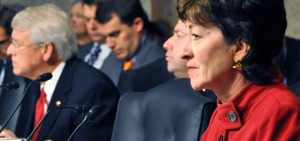
U.S. Sen. Susan Collins, who’s supporting a resolution condemning a harshly anti-gay Uganda bill, said the measure is ‘appalling and I want to convey that.’ (DC Agenda photo by Michael Key)
Lawmakers in both chambers of Congress last week introduced resolutions condemning a harshly anti-gay bill pending in Uganda.
In the Senate, the sponsor of the resolution is Sen. Russ Feingold (D-Wis.), chair of the Foreign Relations African Affairs subcommittee. The sponsor of the resolution in the House is Rep. Howard Berman (D-Calif.), chair of the House Foreign Affairs Committee.
Homosexual acts are already illegal in Uganda, but the African nation’s pending legislation would, among other things, institute the death penalty in some cases for LGBT people and require citizens to report LGBT people to the police.
In a statement, Berman said passage of the Uganda bill could interfere with efforts to address the HIV/AIDS epidemic in the country.
“The proposed Ugandan bill not only threatens human rights, it also reverses so many of the gains that Uganda has made in the fight against HIV/AIDS,” he said. “This issue has united leaders of different political and religious views in Uganda and worldwide in one common belief in the rights of all human beings regardless of sexual orientation.”
The Senate resolution goes further than the House measure, calling for repeal of the criminalization of homosexuality in other countries and urging the State Department to closely monitor human rights abuses against LGBT people abroad.
Both resolutions enjoy considerable support from lawmakers of both parties. More than three-dozen House members joined to introduce the House measure, including gay Reps. Barney Frank (D-Mass.) and Tammy Baldwin (D-Wis.), as well as Congressional Black Caucus Chair Rep. Barbara Lee (D-Calif.). On the other side of the aisle, Rep. Ileana Ros-Lehtinen (R-Fla.) has signed on in support.
Lynne Weil, spokesperson for the House Foreign Affairs Committee, said the panel would make a decision on how to proceed with the resolution in the coming weeks.
For the Senate resolution, a politically diverse group of lawmakers are co-sponsors. In addition to Sen. Ben Cardin (D-Md.), original co-sponsors included Sens. Tom Coburn (R-Okla.) and Susan Collins (R-Maine).
Collins told DC Agenda she was interested in co-sponsoring the Senate resolution because of the draconian nature of Uganda’s bill.
“This is an appalling proposal in Uganda, which suggests the death penalty for homosexual acts,” she said. “I think it’s self-evident that I would think that that’s appalling and I want to convey that.”
Mark Bromley, chair of the Council for Global Equality, said bipartisan support for the resolution shows the tremendous attention that Uganda’s bill has received from human rights advocates.
“Senators from across the ideological divide are expressing that this is a significant human rights issue and an issue that the U.S. government takes seriously,” he said.
Bromley said the resolutions are “not simply symbolic” and have a chance of passing in both chambers of Congress.
On Monday, another lawmaker expressed opposition to Uganda’s bill during a demonstration outside the Uganda mission to the United Nations in New York City, according to Human Rights First.
Rep. Carolyn Maloney (D-N.Y.) said in a statement that the “officially sanctioned bigotry” in the legislation is “profoundly disturbing.”
“It constitutes a gross violation of the universal values of individual liberty and human rights,” she said. “Such a measure goes far beyond ugliness and ignorance: it is hate in its rawest form, and it has no place in the laws of any nation.”
Maloney was joined at the demonstration by about two dozen other participants, including members of Human Rights First, Immigration Equality, the International Gay & Lesbian Human Rights Commission and Human Rights Watch. The lawmaker called on Ugandan officials to meet with human rights groups to discuss the widespread opposition to the bill.
Paul LeGendre, director of the Fighting Discrimination Program at Human Rights Watch, said during the demonstration that Uganda’s bill “represents one of the harshest discriminatory measures ever proposed in any country.”
“This bill would have disastrous effects for gay men and women in Uganda, would aggravate an already alarming trend of criminalization of homosexuality across Africa, and could spur Ugandan homosexuals to flee this persecution by attempting to seek refuge outside of the country,” he said. “The international community must continue to voice its concern to the Ugandan authorities until the text of this bill is shredded and removed from consideration.”
The path for the legislation in Uganda parliament remains in question. Bromley said he’s “been hearing different stories” about the timeline for the bill, but that it’s likely to come up for debate in the next few weeks.
“To be honest, my suspicion is that the president of Uganda would like to see this legislation disappear and so my hope is that they will sort of stretch out the consideration so that eventually the interest dies down a bit, and then, perhaps they can move from it,” he said.
Obama, Clinton stand against Uganda bill
In related news, President Obama and Secretary of State Hillary Clinton reiterated their opposition last week to the Uganda legislation in remarks at the National Prayer Breakfast in D.C.
Clinton said she contacted Ugandan President Yoweri Museveni to directly express U.S. concerns about the anti-gay legislation.
“I recently called President Museveni, whom I have known through the prayer breakfast, and expressed the strongest concerns about a law being considered in the parliament of Uganda,” she said.
Obama called the Uganda measure an “odious” bill in remarks that more broadly drew attention to LGBT issues.
“We may disagree about gay marriage, but surely we can agree that it is unconscionable to target gays and lesbians for who they are — whether it’s here in the United States or, as Hillary mentioned, more extremely in odious laws that are being proposed most recently in Uganda,” he said.
Obama and Clinton’s participation at the National Prayer Breakfast was somewhat controversial because the evangelical Christian group staging the event, known as “The Family,” has ties to Ugandan officials. David Mahati, the author of the anti-gay bill in the country’s parliament, attended past National Prayer Breakfasts, but didn’t attend this year’s event.
LGBT activists praised Obama and Clinton for their remarks. Wayne Besen, executive director of Truth Wins Out, commended Obama for “having the courage to confront those responsible for the heinous anti-gay bill in Uganda.”
Besen helped to coordinate the American Prayer Hour, protest events involving pro-LGBT religious leaders intended to counter the National Prayer Breakfast. The counter-event took place in 20 cities across the country.
“We hope that the president’s laudable stand makes it clear to Family members in the United States and Uganda that the world is watching,” Besen said in a statement. “Religion can no longer be used to justify bigotry, intolerance and persecution anywhere on the face of the Earth.”
Bromley also said Obama and Clinton’s decision to speak out against the Uganda legislation during the National Prayer Breakfast was a “very positive” move because of the religious nature of the event.
“I think clearly there were some religious voices behind the bill in Uganda, so we thought it was incredibly powerful that the president and first lady attended the breakfast, spoke from a personal perspective about religion and how this bill from any religious perspective just is unacceptable,” Bromley said.
But according to the French news agency Agence France-Presse, Uganda’s Ethics Minister James Buturo responded angrily to Obama and Clinton for speaking out against the Uganda bill.
“Somebody should tell President Obama that the parliament is doing its legislative duty in the interest of the people of Uganda,” Buturo was quoted as saying. “We cannot tell the Senate what to do. We cannot tell Congress what to do. So why do they feel that they can tell us what we should do in the interest of our people?”
New York
Men convicted of murdering two men in NYC gay bar drugging scheme sentenced
One of the victims, John Umberger, was D.C. political consultant

A New York judge on Wednesday sentenced three men convicted of killing a D.C. political consultant and another man who they targeted at gay bars in Manhattan.
NBC New York notes a jury in February convicted Jayqwan Hamilton, Jacob Barroso, and Robert DeMaio of murder, robbery, and conspiracy in relation to druggings and robberies that targeted gay bars in Manhattan from March 2021 to June 2022.
John Umberger, a 33-year-old political consultant from D.C., and Julio Ramirez, a 25-year-old social worker, died. Prosecutors said Hamilton, Barroso, and DeMaio targeted three other men at gay bars.
The jury convicted Hamilton and DeMaio of murdering Umberger. State Supreme Court Judge Felicia Mennin sentenced Hamilton and DeMaio to 40 years to life in prison.
Barroso, who was convicted of killing Ramirez, received a 20 years to life sentence.
National
Medical groups file lawsuit over Trump deletion of health information
Crucial datasets included LGBTQ, HIV resources
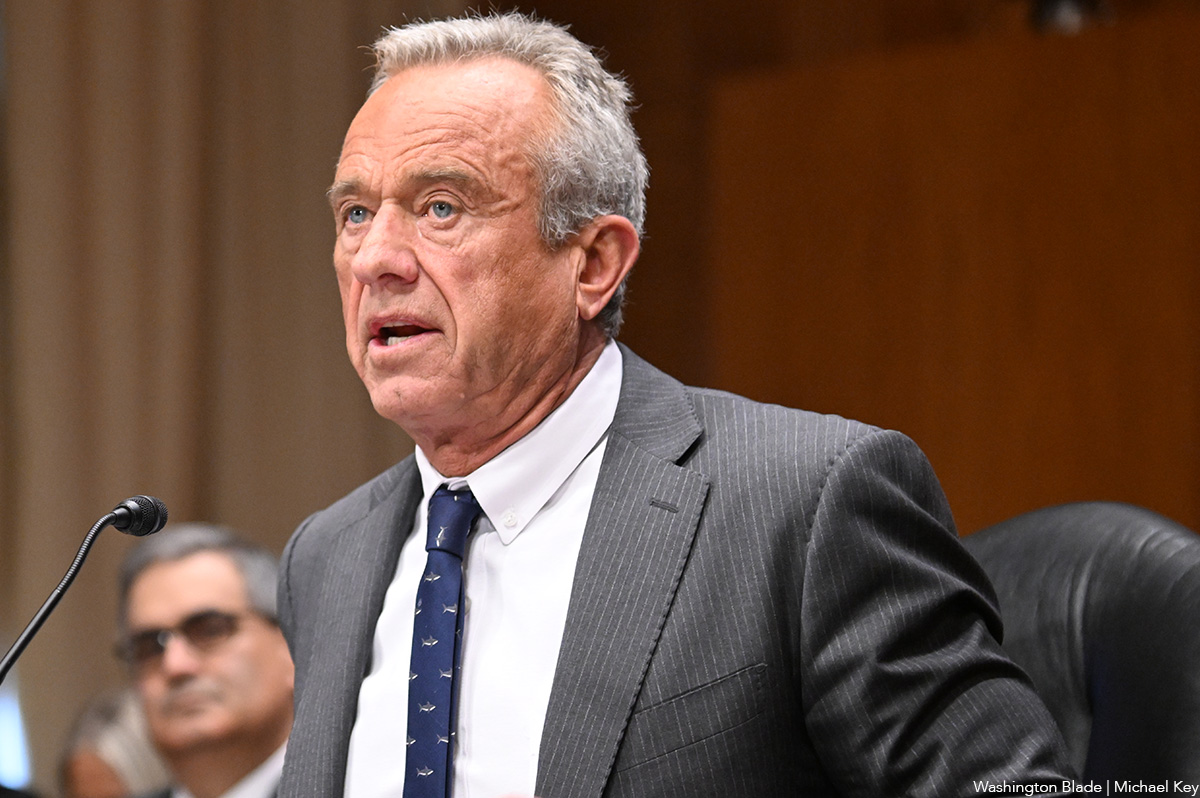
Nine private medical and public health advocacy organizations, including two from D.C., filed a lawsuit on May 20 in federal court in Seattle challenging what it calls the U.S. Department of Health and Human Services’s illegal deletion of dozens or more of its webpages containing health related information, including HIV information.
The lawsuit, filed in the United States District Court for the Western District of Washington, names as defendants Robert F. Kennedy Jr., secretary of the Department of Health and Human Services (HHS) and HHS itself, and several agencies operating under HHS and its directors, including the Centers for Disease Control and Prevention, the National Institutes of Health, and the Food and Drug Administration.
“This action challenges the widespread deletion of public health resources from federal agencies,” the lawsuit states. “Dozens (if not more) of taxpayer-funded webpages, databases, and other crucial resources have vanished since January 20, 2025, leaving doctors, nurses, researchers, and the public scrambling for information,” it says.
“These actions have undermined the longstanding, congressionally mandated regime; irreparably harmed Plaintiffs and others who rely on these federal resources; and put the nation’s public health infrastructure in unnecessary jeopardy,” the lawsuit continues.
It adds, “The removal of public health resources was apparently prompted by two recent executive orders – one focused on ‘gender ideology’ and the other targeting diversity, equity, and inclusion (‘DEI’) programs. Defendants implemented these executive orders in a haphazard manner that resulted in the deletion (inadvertent or otherwise) of health-related websites and databases, including information related to pregnancy risks, public health datasets, information about opioid-use disorder, and many other valuable resources.”
The lawsuit does not mention that it was President Donald Trump who issued the two executive orders in question.
A White House spokesperson couldn’t immediately be reached for comment on the lawsuit.
While not mentioning Trump by name, the lawsuit names as defendants in addition to HHS Secretary Robert Kennedy Jr., Matthew Buzzelli, acting director of the Centers for Disease Control and Prevention; Jay Bhattacharya, director of the National Institutes of Health; Martin Makary, commissioner of the Food and Drug Administration; Thomas Engels, administrator of the Health Resources and Services Administration; and Charles Ezell, acting director of the Office of Personnel Management.
The 44-page lawsuit complaint includes an addendum with a chart showing the titles or descriptions of 49 “affected resource” website pages that it says were deleted because of the executive orders. The chart shows that just four of the sites were restored after initially being deleted.
Of the 49 sites, 15 addressed LGBTQ-related health issues and six others addressed HIV issues, according to the chart.
“The unannounced and unprecedented deletion of these federal webpages and datasets came as a shock to the medical and scientific communities, which had come to rely on them to monitor and respond to disease outbreaks, assist physicians and other clinicians in daily care, and inform the public about a wide range of healthcare issues,” the lawsuit states.
“Health professionals, nonprofit organizations, and state and local authorities used the websites and datasets daily in care for their patients, to provide resources to their communities, and promote public health,” it says.
Jose Zuniga, president and CEO of the International Association of Providers of AIDS Care (IAPAC), one of the organizations that signed on as a plaintiff in the lawsuit, said in a statement that the deleted information from the HHS websites “includes essential information about LGBTQ+ health, gender and reproductive rights, clinical trial data, Mpox and other vaccine guidance and HIV prevention resources.”
Zuniga added, “IAPAC champions evidence-based, data-informed HIV responses and we reject ideologically driven efforts that undermine public health and erase marginalized communities.”
Lisa Amore, a spokesperson for Whitman-Walker Health, D.C.’s largest LGBTQ supportive health services provider, also expressed concern about the potential impact of the HHS website deletions.
“As the region’s leader in HIV care and prevention, Whitman-Walker Health relies on scientific data to help us drive our resources and measure our successes,” Amore said in response to a request for comment from the Washington Blade.
“The District of Columbia has made great strides in the fight against HIV,” Amore said. “But the removal of public facing information from the HHS website makes our collective work much harder and will set HIV care and prevention backward,” she said.
The lawsuit calls on the court to issue a declaratory judgement that the “deletion of public health webpages and resources is unlawful and invalid” and to issue a preliminary or permanent injunction ordering government officials named as defendants in the lawsuit “to restore the public health webpages and resources that have been deleted and to maintain their web domains in accordance with their statutory duties.”
It also calls on the court to require defendant government officials to “file a status report with the Court within twenty-four hours of entry of a preliminary injunction, and at regular intervals, thereafter, confirming compliance with these orders.”
The health organizations that joined the lawsuit as plaintiffs include the Washington State Medical Association, Washington State Nurses Association, Washington Chapter of the American Academy of Pediatrics, Academy Health, Association of Nurses in AIDS Care, Fast-Track Cities Institute, International Association of Providers of AIDS Care, National LGBT Cancer Network, and Vermont Medical Society.
The Fast-Track Cities Institute and International Association of Providers of AIDS Care are based in D.C.
U.S. Federal Courts
Federal judge scraps trans-inclusive workplace discrimination protections
Ruling appears to contradict US Supreme Court precedent
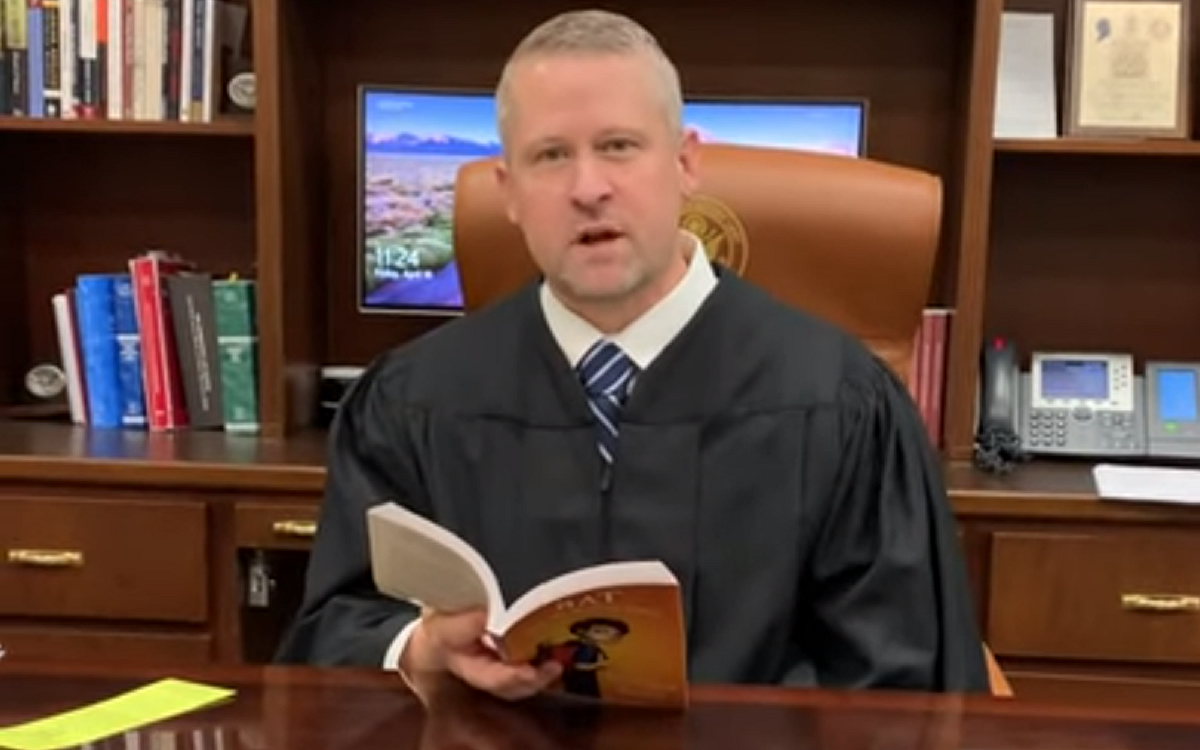
Judge Matthew Kacsmaryk of the U.S. District Court for the Northern District of Texas has struck down guidelines by the U.S. Equal Employment Opportunity Commission designed to protect against workplace harassment based on gender identity and sexual orientation.
The EEOC in April 2024 updated its guidelines to comply with the U.S. Supreme Court’s ruling in Bostock v. Clayton County (2020), which determined that discrimination against transgender people constituted sex-based discrimination as proscribed under Title VII of the Civil Rights Act of 1964.
To ensure compliance with the law, the agency recommended that employers honor their employees’ preferred pronouns while granting them access to bathrooms and allowing them to wear dress code-compliant clothing that aligns with their gender identities.
While the the guidelines are not legally binding, Kacsmaryk ruled that their issuance created “mandatory standards” exceeding the EEOC’s statutory authority that were “inconsistent with the text, history, and tradition of Title VII and recent Supreme Court precedent.”
“Title VII does not require employers or courts to blind themselves to the biological differences between men and women,” he wrote in the opinion.
The case, which was brought by the conservative think tank behind Project 2025, the Heritage Foundation, presents the greatest setback for LGBTQ inclusive workplace protections since President Donald Trump’s issuance of an executive order on the first day of his second term directing U.S. federal agencies to recognize only two genders as determined by birth sex.
Last month, top Democrats from both chambers of Congress reintroduced the Equality Act, which would codify LGBTQ-inclusive protections against discrimination into federal law, covering employment as well as areas like housing and jury service.

